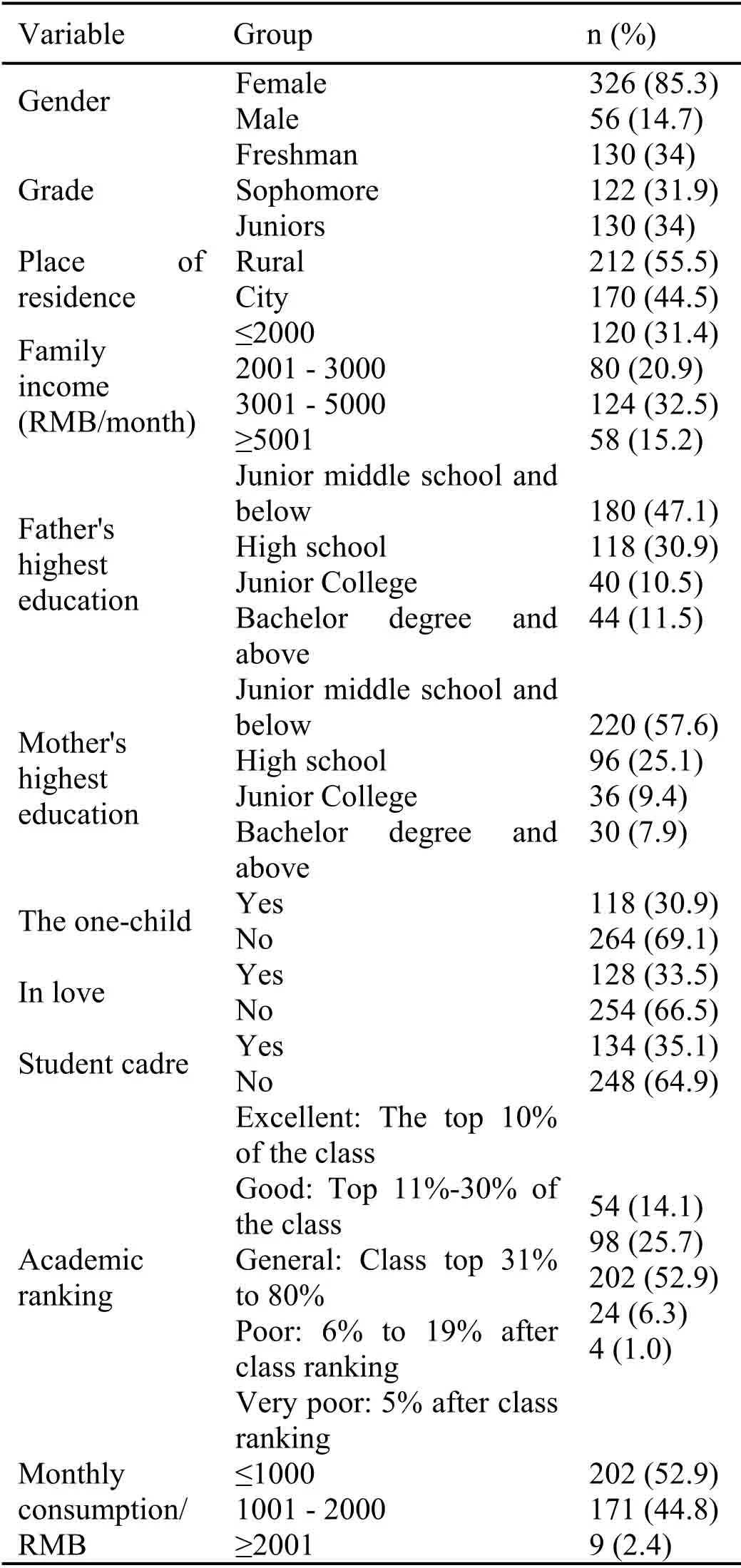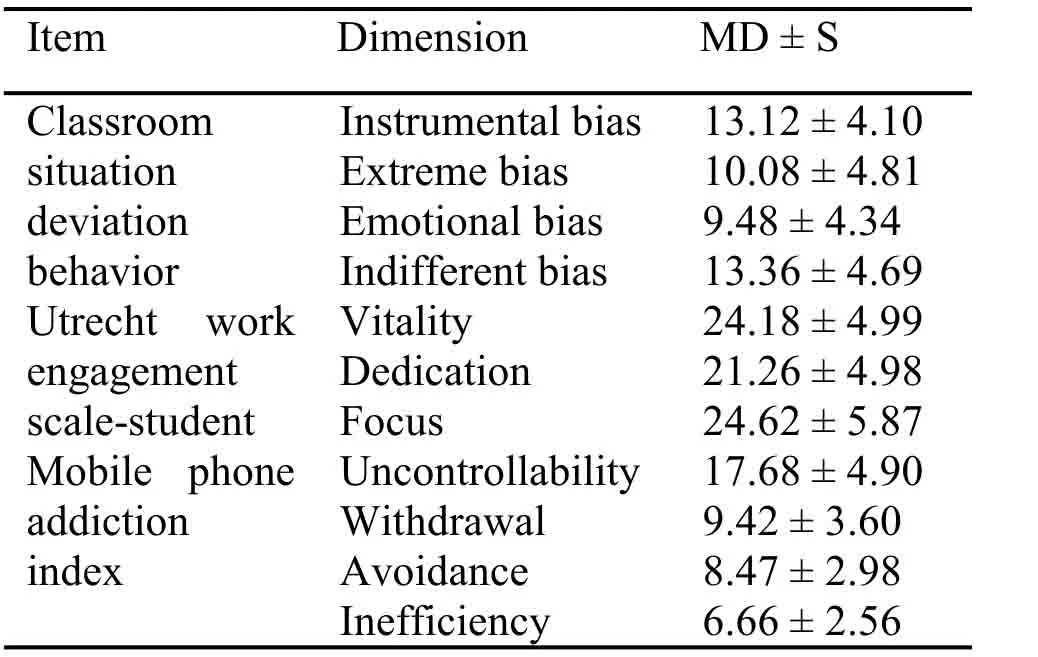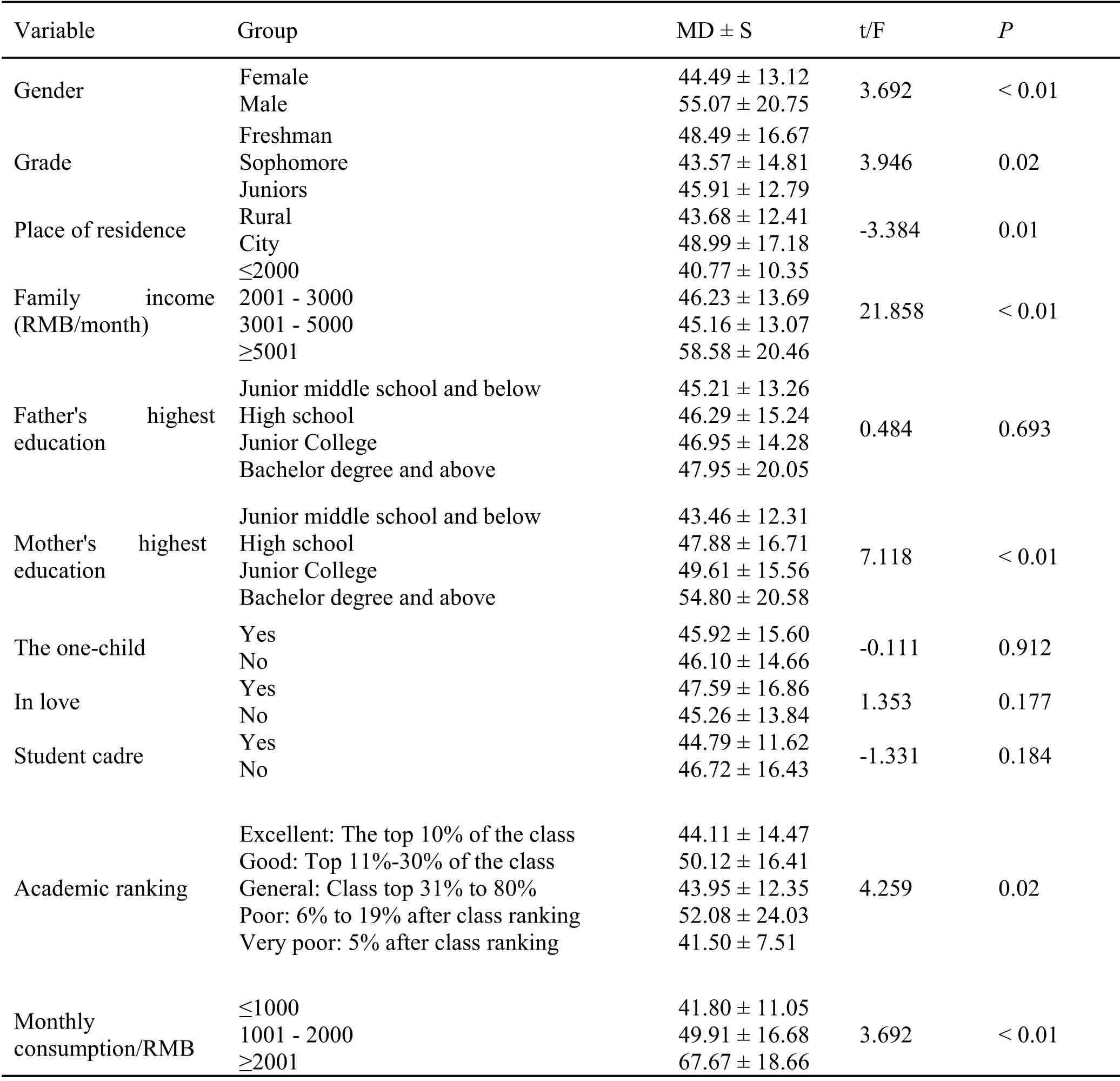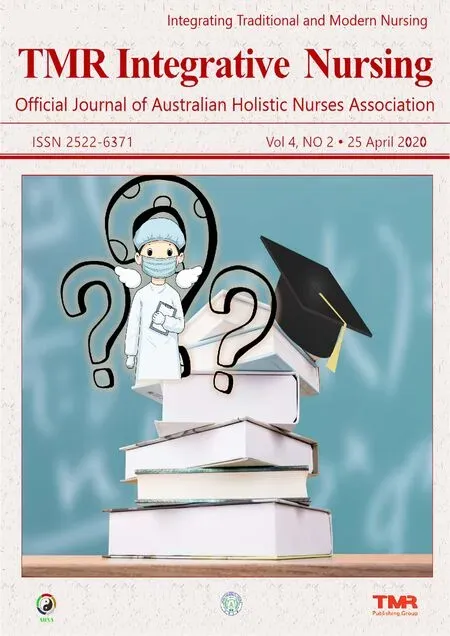Current situation and influencing factors of classroom situation deviant behavior of undergraduate nursing students in colleges of traditional Chinese medicine
Yan-Qiu Huang,Chang-De Jin
1Graduate College,Tianjin University of Traditional Chinese Medicine,Tianjin,China; 2School of Nursing,Tianjin University of Traditional Chinese Medicine,Tianjin,China.
Abstract
Keywords: Colleges of traditional Chinese medicine,Nursing students,Classroom situation deviant behavior,Influencing factors
Introduction
The concept of deviation behavior was first proposed by Kaplany in 1975 and then formally introduced into the field of psychology.However,its definition has not been unified till now,and most scholars define it as individual negative and abnormal behavior [1-2].The classroom situation deviant behavior means that students' behavior violates the classroom management rules and deviates from the current teaching activities[3].Studies have shown that in the classroom situation,25% - 35% of students have deviant behaviors,which seriously affect the learning quality and teachers'enthusiasm.In recent years,Chinese traditional medicine industry has developed rapidly [4-6].The Chinese medicine health service development plan(2015 - 2020) clearly points out that it is necessary to enhance the ability of Chinese medicine health service,vigorously train Chinese medicine talents and improve the quality of Chinese medicine health service personnel [7].As the main force of the future Chinese medicine nursing industry,the undergraduate nursing students of traditional Chinese medicine colleges must have solid theoretical knowledge,so it is essential to understand the current situation of classroom situation deviant behavior and related influencing factors.However,there are still few studies in this field at home and abroad.Therefore,this study investigates the current situation and influencing factors of classroom situation deviant behavior of undergraduate nursing students in traditional Chinese medicine colleges,in order to provide some reference and basis for educating managers and relevant scholars in future management and research.
Methods
Participants
Using the method of convenient sampling,400 undergraduate nursing students from Tianjin University of Traditional Chinese Medicine were selected as the survey subjects.Since the seniors have entered clinical practice,this study only selected undergraduate nursing students in the first,second and third years as the research objects.
Instrument
General situation questionnaire.The content includes:Gender,age,grade,place of residence,etc.The scale is designed on the basis of consulting the literature.
Classroom situation deviant behavior questionnaire.The questionnaire,compiled by Luo SM,et al.contains 4 dimensions and 26 items,including instrumental bias (items 1 - 6),extreme bias (items 7 -13),emotional bias (items 14 -19)and indifferent bias(items 20 - 26) [3].Each item was assessed by a five-point Likert scale that ranged from 1 (complete non-conformity) - 5 (complete conformity).The Cronbach's alpha coefficient of the total scale was 0.877,with good reliability and validity.And a high score indicates a high degree of classroom situational deviation.
Utrecht work engagement scale-student.The scale was compiled by Schaufeli,et al.and introduced into China by Fang LT,et al.[8-9].The scale consists 3 dimensions,17 entries,including vitality (entry 1 - 6),dedication (entry 7 - 11),focus (entry 12 - 17),and each item was assessed by a seven-point Likert scale that ranged from 1 (never) - 7 (always).The Cronbach's alpha coefficient of each dimension of UWES-S was 0.858,0.913 and 0.905,and the Cronbach's alpha coefficient of the total scale was 0.951,with good reliability and validity.And a high score indicates a high degree of learning engagement.
Mobile phone addiction index scale.The scale was compiled by Leung et al.and introduced into China by Huang H et al.[10 - 11].The scale contains 4 dimensions and 17 items,including uncontrollability(item 1 - 7),withdrawal (item 8 - 11),avoidance (item 12 -14) and inefficiency (item 15 -17),and each item was assessed by a five-point Likert scale that ranged from 1 (completely no) - 5 (always).The Cronbach's alpha coefficient of each dimension of MPAI ranges from 0.81 to 0.87,and the Cronbach's alpha coefficient of the total scale was 0.91,with good reliability and validity.And a high score indicates a high degree of dependence on mobile phones.
Data collection
Using the method of questionnaire survey,the questionnaire was distributed by author.Before questionnaire was issued,the author explained the purpose,significance and matters needing attention to the participants.After obtaining the informed consent form the respondents,the questionnaire was distributed and retrieved on the spot.A total of 400 questionnaires were distributed in this study,and 382 valid questionnaires were returned.The effective recovery rate was 95.5%.
Ethical consideration
Ethical approval was received from the ethics committee of the Tianjin University of Traditional Chinese Medicine.
Statistical analysis
SPSS 21.0 software was used for descriptive analysis,t-test,one-way ANOVA and multiple linear regression analysis,andP< 0.05 represents a statistically significant.
Results
Characteristics of the participants
The average age of the 382 respondents was (19.65 ±1.19) years; the average daily mobile phone use time was (6.51 ± 3.21) hours; the daily self-study duration was(2.80±1.44)hours,as shown in Table1.

Table1:Characteristics of the participants
Level of classroom situation deviant behavior,learning involvement and mobile phone dependence of nursing students
The overall score of classroom situation deviant behavior,learning involvement and mobile phone dependence was (46.04 ± 14.94),(70.05 ± 14.27) and(42.23 ± 11.31).After dividing each dimension score by the corresponding number of items,the mean score of each dimension is calculated,as shown in Table2.

Table2:Score of classroom situation deviation behavior,UWES-S and MPAI
Univariate analysis of classroom situation deviant behavior of nursing students in different social demography
Taking general demographic data as independent variables and classroom situation deviant behavior as dependent variables for t-test or one-way ANOVA.The results showed that gender,grade,place of residence,family income (RMB/month),mother's highest education level,academic achievement and consumption level/month of nursing students had significant differences in the total score of classroom situation deviant behavior (P<0.05),as shown in Table3.
Multiple linear regression analysis of classroom situation deviant behavior of nursing students
Taking the classroom situation deviant behavior as the dependent variable,the statistically significant variables in the univariate analysis,learning involvement and mobile phone dependence as the independent variables were included into the multiple linear regression model.Variable selection was carried out by stepwise regression method.The result showed that the adjustment coefficient R2= 0.329,that is,the six variables explained 32.9% of the total variation of the classroom situation deviant behavior of the nursing students.As can be seen from the standardized regression coefficient,the independent variables influencing the dependent variables from the largest to the least are monthly consumption/RMB 1000&2001,monthly consumption/RMB 1000-2000 & 2001,mobile phone dependence,gender,academic ranking good & very poor and learning involvement,as shown in Table4.
Discussion
The classroom situation deviant behavior of undergraduate nursing students in colleges of traditional Chinese medicine is moderately upper-levelThe results showed that the score of classroom situation deviant behavior of undergraduate nursing students was (46.04 ± 14.94),which was above the median 42.Indifferent deviant and instrumental deviant scored the highest,which was basically consistent with the research results of Jiang XY,et al.[12-13].The reasons may be as follows:(1)Compared with other majors,nursing profession have heavier learning tasks,and due to the profound of medical theoretical knowledge,the class is often lack of activity,which makes it difficult to arouse students' interest in learning,and eventually leading nursing students'indifference to the teaching content and teachers in class [14].(2) With the rapid development of information technology,mobile phones have become one of the necessary tools for people.The phenomenon that students play mobile phone,send WeChat messages and watch video in class is becoming more and more serious,which reduces students' enthusiasm for learning and leading to classroom situational deviation [15].Therefore,it is suggested that colleges should constantly improve students' classroom management system,and relevant teachers should also constantly improve their own teaching level,enrich teaching forms and improve teaching quality,so as to reduce the classroom situation deviant behavior of nursing students.

Table3:Comparison the scores of classroom situation deviant behavior among nursing students with different characteristics

Table4:Regression analysis of classroom situation deviant behavior
Analysis the influencing factors of classroom situation deviant behavior of undergraduate nursing students in traditional Chinese medicine Gender.The results showed that gender was one of the influencing factors of classroom situation deviant behavior of nursing students,among which the level of classroom situation deviant behavior of males was higher than that of females,which was consistent with the research results of Zhao C [16].The reasons may be as follows:(1) Due to gender differences,females are more concerned about the external evaluation of themselves than males,such as the recognition of teachers and elders,the recognition of males,and more hope to achieve good academic results,while males pay more attention to self-identification,such as personal background,personal value realization,etc.[17].Therefore,females have fewer classroom situation deviant behavior than males.(2) Compared with female,male have lower self-control,and are more likely to indulge in online games,so they spend less time on learning,so they are more likely to have classroom situation deviant behavior[18].Therefore,it is suggested that relevant colleges and universities should pay more attention to the psychological status of male nursing students on the basis of respecting gender differences,offering more psychological lectures and organizing various types of extracurricular activities in order to reduce the level of classroom situation deviant behavior of male nursing students.
Academic ranking.The results showed that academic ranking was one of the influencing factors of classroom situation deviant behavior of nursing students,among which the students with good academic performance had higher level of situational bias than those with poor academic performance.The reasons may be as follows:(1) Compared with the students with good grades,the students with poor grades lack systematic learning methods and strategies,and the learning pressure is relatively large [19].Therefore,their deviant behavior in class is relatively less.(2)Students with good academic performance are mostly at the upper-middle level,so the sense of presence in class is weak.The teacher's attention and expectation are low,and the pressure from the parents is relatively small,which making them more easily to have classroom situation deviant behaviors [20].Therefore,it is suggested that teachers should give more care and guidance to students with poor academic performance,help them find their own learning methods,improve learning efficiency and self-confidence.At the same time,we should change the concept of achievement first,pay attention to the psychological dynamics of each student,and treat them equally.
Monthly consumption.The results showed that monthly consumption was one of the influencing factors of classroom situation deviant behavior of nursing students.Compared with nursing students whose monthly consumption ≥ 2001 yuan,nursing students whose monthly consumption level was ≤1000 yuan and 1000 - 2000 yuan had a lower level of classroom situation deviant behavior,that is,the higher of the monthly consumption level of nursing students,the more serious of the classroom situation deviant behavior,which was similar to the results of Yan FF,et al.[21-22].The reasons may be as follows:(1)Most of the students with low monthly consumption are from rural areas,and the family conditions are relatively poor.Therefore,the opportunities for learning are more cherished,and the classroom situation deviant behavior are less likely to occur.(2) Students with higher monthly consumption levels have higher family living standards.Parents are more dote on their children,which leading them lack the spirit of hard working [23].Therefore,it is suggested that parents should reasonably arrange the monthly living allowance for students and guide them to develop good consumption views and learning attitudes.
Learning involvement.The results showed that learning involvement was one of the influencing factors of classroom situation deviant behavior of nursing students,the higher of learning engagement of nursing students,the lower of classroom situation deviant behavior,which was similar to previous research results [24].The reasons may be that students with low learning involvement tend to have low recognition of nursing profession,so they lack the interest of medical knowledge and unwilling to interact with teachers,which leads to the emergence of classroom situation deviant behavior[25].Therefore,it is suggested that nursing colleges should invite excellent nurses to give lectures on career planning to help students better understand the nursing profession.Relevant nursing educators should also strengthen the professional ideological education of nursing students in daily teaching and guide them to form correct vocational and learning concepts.
Mobile phone dependence.The results showed that mobile phone dependence was one of the influencing factors of classroom situation deviant behavior of nursing students,the higher of mobile phone dependence of nursing students,the higher of classroom situation deviant behavior,which was similar to previous research results [26].The reasons may be as follows:(1) Nursing students with high dependence on mobile phones often waste a lot of time on playing mobile phones,which not only reducing their learning time,but also leading to the lack of communication with teachers and classmates,and even leads to the emergence of learning-weariness [27].(2)Most of the students with mobile phone dependence are addicted to shopping,games and chatting,and the more serious of mobile phone dependence,the worse of sleep quality at night,which leads to sleepiness and lack of energy in class [28-29].It also suggests that relevant managers should pay attention to the consequences of mobile phone dependence of nursing students,help them realize the harm of excessive use of mobile phones,and guide them reasonably planning mobile phone using time,so as to reduce the status quo of mobile phone dependence and classroom situation deviant behavior of nursing students.
Conclusion
In conclusion,the classroom situation deviant behavior of undergraduate nursing students in colleges of traditional Chinese medicine is moderately upper-level.Gender,academic ranking,monthly consumption,learning involvement and mobile phone dependence are the influencing factors.Therefore,the administrators of colleges should constantly improve the classroom management system,pay attention to students’ psychological dynamics,and help students establish correct learning attitudes and values.Relevant teachers should also constantly improve their teaching level,enrich the teaching forms,and enhance students' participation in class,in order to reduce the occurrence of classroom situation deviant behavior of nursing students.
Study limitation
This study adopted a method of convenient sampling.The sample was not completely randomized,and the representativeness of the sample needed to be further improved.In addition,only the nursing students of Tianjin University of Traditional Chinese Medicine were selected as the research object.The sample size is relatively small.Therefore,it is suggested that relevant scholars should carry out longitudinal studies of large random samples in future studies to further verify the accuracy of the research results.
- Nursing Communications的其它文章
- Critical reflection on the role of senior staff nurse
- Nursing as a profession:Undergraduate female students’perception
- Application of "Internet+" question-based teaching mode in the teaching of characteristic nursing of Dai medicine
- The competence of nursing students to prevent pressure injury - a scoping review

